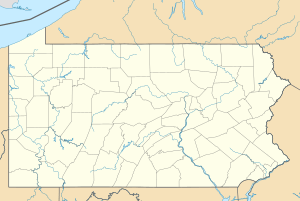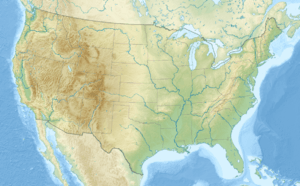Damon Run (Brokenstraw Creek tributary) facts for kids
Quick facts for kids Damon Run |
|
|---|---|
|
Location of Damon Run mouth
|
|
| Other name(s) | Tributary to Brokenstraw Creek |
| Country | United States |
| State | Pennsylvania |
| County | Warren |
| Physical characteristics | |
| Main source | divide between Damon Run and Prosser Run about 1 mile southeast of Baker Hill 1,690 ft (520 m) 41°54′43″N 079°31′33″W / 41.91194°N 79.52583°W |
| River mouth | Brokenstraw Creek about 1.5 miles northwest of Spring Creek, Pennsylvania 1,368 ft (417 m) 41°53′21″N 079°32′53″W / 41.88917°N 79.54806°W |
| Length | 2.06 mi (3.32 km) |
| Basin features | |
| Progression | southeast |
| River system | Allegheny River |
| Basin size | 2.17 square miles (5.6 km2) |
| Tributaries |
|
| Bridges | Way Road, Lucky Lane |
Damon Run is a small stream, about 2.06 mi (3.32 km) long, located in Pennsylvania, United States. It's like a smaller helper stream, called a 'tributary,' that flows into a bigger one named Brokenstraw Creek. The water in Damon Run is very cold and clean, which is why the Pennsylvania Fish and Boat Commission calls it a 'cold-water fishery' – a great place for certain fish that love chilly water!
Where Does Damon Run Flow?
Damon Run starts in Warren County, Pennsylvania. Its journey begins near a place called Baker Hill, where the land divides the water flow between Damon Run and another stream called Prosser Run. From there, Damon Run flows towards the southeast.
The stream travels for about 2.06 mi (3.32 km). It eventually joins Brokenstraw Creek, which is a larger stream. This meeting point is about 1.5 miles northwest of a town called Spring Creek, Pennsylvania. The water from Damon Run then becomes part of Brokenstraw Creek, and eventually, it all flows into the Allegheny River.
The Land Around Damon Run
The area that Damon Run drains is called its 'watershed.' This watershed covers about 2.17 square miles (5.6 km2) of land. It's part of a region known as the Pennsylvania High Plateau province, which has unique landscapes shaped by glaciers long ago.
The ground beneath the watershed is made up of something called the Venango Formation. This area gets a good amount of rain and snow, about 45.8 inches each year. A large part of the watershed, about 62%, is covered in forests. These forests help keep the water clean and provide homes for many animals.
 | Mary Eliza Mahoney |
 | Susie King Taylor |
 | Ida Gray |
 | Eliza Ann Grier |



